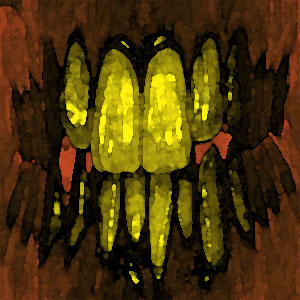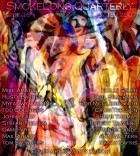The word “deep” evokes, for me, the heart of this story. Yes?
No! Close, but I’m sorry, “deep” is the wrong answer. The correct answer to the question of what word, evokes, for you, the heart of this story, is “balls.” The original title of this tale, eventually tossed aside for reasons of putting way too fine a point on it, was “Balls Deep in the Heart of Texas,” thus making “Balls”, and not “Deep,” the very first word of the story, and thus the very most evocative. But how could you have known this? You couldn’t have. Not unless I came right out and told you. Which is exactly what interviews are for.
What did you discover as you probed the depths of this story?
To be honest, I did very little probing. The story was written, essentially, as an exercise in ignorance. I manifestly don’t remember the Alamo. And I tried, as I wrote, to keep myself empty of any new knowledge, and I just went with all the bits and pieces of half-knowledge and legend I’d acrued over the years, which was really very little. And the rest is just purposely ridiculous. Of course I know enough, obviously, to know that the Mexican soldiers did not at the time wear mocossins, nor did they carry baby elk antlers grappling hooks. To imply that they did, seen from one light, my light I guess, is just sort of fun, sort of goofy, in its obvious wrongness filtered through that sort of all-knowing, all-encompassing voice. Seen from another light, it’s borderline racist, I guess. But what’s odd is that those are the ideas that popped into my head, when I was typing. So I guess, as I probe the depths of the story now, I realize that I’m racist, a little; that when I want to make up random facts about Mexican soldiers I make them seem primitive and scary and sort of the faceless enemy, and when I want to make up random facts about the Texans, I make them human and loving. So in the end, I’m really much more worried about offending Mexicans here, or Mexican-American’s, than I am about offending Texans.
Now, when I remember the Alamo, well, it will be a wee bit different than before. What award do you think Texas will now bestow upon you?
My best guess is that literally no awards will be bestowed upon me by the state of Texas. But the thing is, I kind of love Texas, though I’ve never been. I mean, I don’t think Manifest Destiny was or is the most defensible policy in the world, and I wonder, a lot, why more people don’t proffer up Andrew Jackson in any discussion of our worst presidents ever, but I still think Texas, at this point, is kind of an awesome state. I love Larry McMurtry. And I love the Geto Boys. To just name two cultural treasures that come to mind. So I have no beef with Texas. Ornette Coleman got a nice award from the Texas Cultural Trust this year, so whoever’s handing out the awards down there must know what they’re doing. I wouldn’t mind a little something though. I wouldn’t refuse it. You don’t look a gift horse in the mouth. You just don’t. No matter what that mouth might look like. And how directly in front of your face it might be.
Whole lot of shakin’ going in the Travieso abode. Tin House acceptances. Pushcart nomination. Wow. Describe, in detail, your reaction to both, including any dances and/or special moves involved. And any projects currently in the works?
My reaction to all three bits of good news was exactly the same: I called my mother, then my brother, then my dad and then my best friend, because I knew that they’d be just proud of me, and just happy, and that my happiness was their happiness, and vice versa. Also, when I first heard from Tin House I was dating a girl, or I guess I’d recently stopped dating a girl, who sort of thought, I think, that I was on my way toward becoming one of those slovenly, unambitious dudes who, instead of getting a real job and a succesful career, decides instead to forever work on some vague creative project or another, none of which will ever, ever amount to anything at all. So since I was starting to think the exact same thing, it was really nice to have some validation, and it was doubly nice to tell her about it. The Pushcart thing was such a non-event that I only heard about it after googling myself. I’m currently working on a novel called “Can you Hear Me?” and doing my best to ensure that it doesn’t become just another vague creative project that never amounts to anything at all.
At the recent AWP conference, a number of writers talked about their old flames, books that have influenced them during a formative time in their lives—and ones they return to for lessons in writing and, of course, life. Discuss your old flame, both what it meant to you then and what it means to you now.
I wonder how far back I should go here. I’m not really old enough to have a true old flame. All the books I loved as a child—like Watership Down, like The Chocolate War, like The World According to Garp, like Cat’s Cradle, like The Centaur—can’t count, because I really don’t come back to them anymore, mostly because I no longer have them in my possesion. The book that really, really freaked me out, in a good way, when I was like ten or eleven, was Watership Down. I used to make up my own little stories about the characters in that book, with little terrible rabbit drawings. I’ve never visualized a book more clearly, I don’t think. I was into that book all through high school, a big white hardback that was my older brother’s. But if I learned any lessons, I mean technical lessons, they’re fully encorporated by now, and irremovable from my basic skill set. The other book for me, the most important one probably, and certainly my “favorite” is The Mezzanine, by Nicholson Baker, which I read the summer after graduating from college. It was the first book, maybe, that made me want to become best friends with the writer, as opposed to one of the characters. I read that book all of the time. All of the time. There’s other Baker books that are a bit better, I think—I think Room Temperature might be better; it’s riskier, at least, and The Fermata is great—but The Mezzanine is just special to me.



 The core workshop of SmokeLong Fitness is all in writing, so you can take part from anywhere at anytime. We are excited about creating a supportive, consistent and structured environment for flash writers to work on their craft in a community. We are thrilled and proud to say that our workshop participants have won, placed, or been listed in every major flash competition. Community works.
The core workshop of SmokeLong Fitness is all in writing, so you can take part from anywhere at anytime. We are excited about creating a supportive, consistent and structured environment for flash writers to work on their craft in a community. We are thrilled and proud to say that our workshop participants have won, placed, or been listed in every major flash competition. Community works.